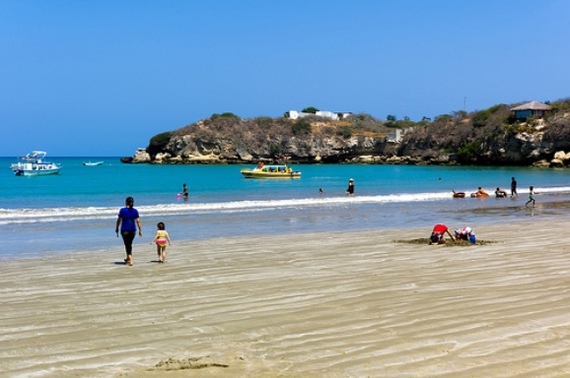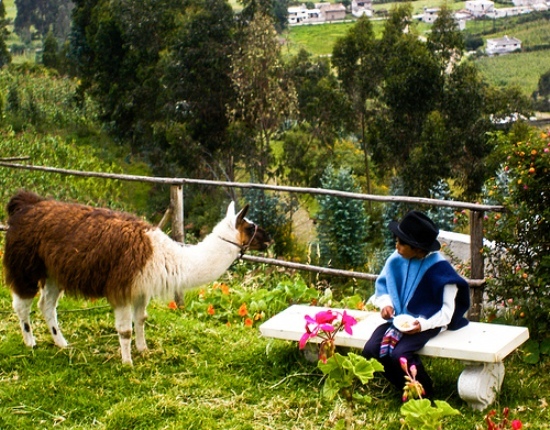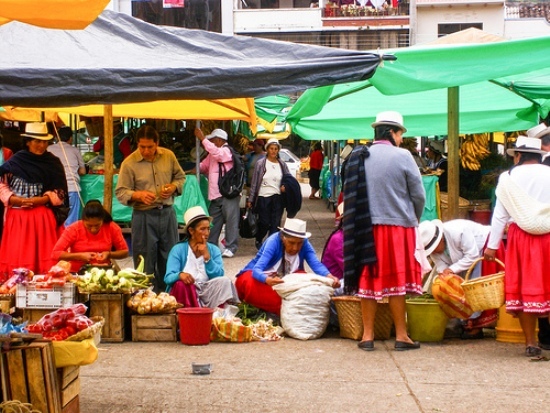On our first trip to Ecuador, in 2001, we both remarked about how clean the city of Quito seemed to us. We were comparing it to other Latin American destinations where we had spent time.
Quiteños, it appeared, took pride in their city. There were the uneven sidewalks, to be sure. (Those are ubiquitous everywhere in Latin America, of course.) You had to watch your step. While many of the buildings had seen better days and definitely needed a coat of paint, there was little litter in the streets. The many parks and the yards we could see behind high walls were well-tended. There were panhandlers here and there, but few stray dogs.

Photo courtesy of Hugo Ghiara, InternationalLiving.com
Now, after 12 years of living in Latin America, we know that our first impressions of Quito were made of our experiences in just a handful of its neighborhoods. Just like the city of Omaha, Nebraska, where we're from, there are neighborhoods of Quito (and every other city in the world) where vacant lots are overgrown and full of trash, and where sidewalks are non-existent... the places most of us prefer to avoid.
We've been thinking about this lately, and especially during a recent trip to Ecuador's Pacific Coast. While people are the same everywhere in the world (we all love our families and want a better world for our children, for instance), the Latin culture is, plain and simply, different than ours. Travel anywhere outside the U.S. and Canada and most of Europe, in fact, and you'll encounter a different "aesthetic."

Photo courtesy of Steenie Harvey, InternationalLiving.com
In the poorest communities of the developing world, it doesn't much matter if something is the newest, the shiniest, or even the cleanest... although even that is relative, depending on your perspective. Few homes have hot water, for instance. Some have no bathroom facilities at all.
You still see local women washing clothes by hand in shallow river streams, and cooking over wood fires. And you see them sweeping the dirt floors of their homes and hearths... Look beyond the peeling paint and the holes in the roof and piles of wood scattered here and there, and you'll often see a very tidy homestead.
As you might imagine, the smaller tax bases of Latin American countries means the infrastructure is generally a bit rougher. Roads often don't have wide shoulders or guard rails or lanes lines. Sometimes the dividing line paint has worn away. There aren't funds to paint buildings or to rescue stray animals or to smoothly pave the sidewalks. If you travel to Latin America... or Asia, Africa, the Middle East, or the Caribbean, for that matter... you'll quickly notice all these things.
And none of this seems to bother anyone too much... except, of course, for some of the foreigners who come to visit and expect to find things in Ecuador (or any other developing country) to look and feel and behave the same as "back home."

Photo courtesy of Steenie Harvey, InternationalLiving.com
Please don't do that. You will be disappointed.
Yes, of course, you'll find shiny, high-tech shopping malls and grocery stores in Ecuador and in every country of Latin America... and you'll find an emerging middle class who can afford to shop in them. But the majority of the population in any developing country is not middle class.
"Work," of course, is what people who live in small towns everywhere in the world do to get by. But unlike in the U.S., people in Latin America don't work to buy clothes and cosmetics and toys for the kids at Wal-Mart. They fish or they farm to put food on the table. And maybe they sell a bit of what's left over so they can buy the kids' school supplies and treat the family to ice cream now and then.
Life is lived for the moment. On those rare special days when there is less work to be done, they turn the music up (loudly) and share that priceless commodity called time with friends and family.
Whose system is better? Again, depends on your perspective.
This is a long, roundabout way of saying that Latin America or Asia may very well have what you are looking for in a retirement destination. Beaches, mountains, lush forests, beautiful cities, and a nearly perfect year-round climate. No doubt you'll find a comfortable place to live with all the modern-day conveniences you require: hot water, high-speed Internet, good restaurants, and plenty of activities to keep you busy. But they're not for everyone. And they're certainly not the USA...
But the important thing to keep in mind is that no place is perfect for everyone (and thank goodness for that). There are spots along the coast that aren't as appealing to me as they may be to you... and vice versa.
That's why we always recommend you pay a visit to Ecuador (or any place you may be considering to live) before you make any final decisions. Be sure you leave yourself plenty of time. Ecuador isn't a place that's easily digested in a week or two. A month is about right if you want to explore both the coast and the mountains. It's taken me two weeks, in fact, just to travel from Guayaquil to Esmeraldas... a night here, two nights there... and I'm still pondering which area I liked the most.
I met expats in every community I visited, and of course, they feel they've found that "perfect spot." Some have started small businesses and others are just living the retirement life of their dreams. To a person, when I asked what they would have done differently, if anything, they said they would have worked harder to learn Spanish before they came here. So that's a tip for you: start now and get your "survival Spanish" in order.
As one expat (who obviously needs to work a little harder) said, "Feel free to call me, but I have no idea how much time I have on my phone. It's all in Spanish!"
Related Articles:
We're Thriving on Ecuador's Coast
Living in Cuenca, Ecuador, Has a Downside...
Beach Towns in Ecuador: Which is Best for You?